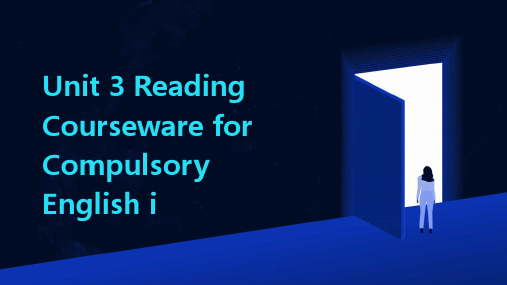高一英语必修二unit3课件
- 格式:docx
- 大小:21.39 KB
- 文档页数:8
















高一英语必修二unit3课件高一英语必修二unit3课件电子课件的内容非常丰富,包括课本、教案、练习、自测、参考书籍和相关案例等,就像一个小型图书馆,给学生的学习带来了极大的便利,学生可以根据自己具体情况自由把握学习的进度。
下面是小编为您整理的关于高一英语必修二unit3课件的相关资料,欢迎阅读!高一英语必修二unit3课件例1一、Teaching Aims 教学目标Teaching containsFrom page 33-351.Target language语言目标a. 重点词汇和短语period, advise…on, continue, fee, fare, gold, be worried about, out of work, stage, vote, position, accept, violence, as a matter of fact, blow up, put in prison, equal, make + O + adj, imagine, in one way, blankets, degree, allow sb to do, guard, stop from, educated, come to power, beg for, terror, fear, cruelty, reward, rights, be proud to do.b. 重点句子It was in 1952 and he had opened a black law firm to advise poor black people on their problems. P34After trying hard, I got a job in a gold mine. P34He told me how to get the correct papers so I could in Johannesburg. P342.Ability goals 能力目标Talk about great peopleExpress your points of viewUse the Attributive Clause with prep. Or the Relative Adverbs: Where, when, and whyLearn to write a passage about a great person.3.Learning ability goals 学能目标Improve the Ss’ abilities of listening and speaking.Enable the Ss to understand the important events completely.Enable the Ss to get a good mastery of some words and expressions.Enable the Ss to learn about the expressions of some famous peopleEnable the students to learn how to talk about the famous great people.二、. Teaching important points 教学重点Understand the real meaning of the hero / heroineWho is your hero / heroine ?Why do you like him / her so much ?三、Teaching difficult points 教学难点The Attributive Clause ( 2 ) --- where, when, why.Use the Attributive Clause with prep. Or the Relative Adverbs: Where, when, and whyLearn to write a passage about a great person.四、Teaching methods 教学方法Fast reading and careful readingAsking and answering activity to check the student’s understanding of the text.Individual, pair or group work to finish each otherDiscussion五、Teaching aids 教具准备Slide projector, Tape-recorder, computer六、Teaching procedures and ways 教学过程Step 1 RevisionGo over what has been learned in the last period.Who do you admire greatly? Yao ming Luxun NewtonStep 2 Background about some charactersWilliam TyndaleWilliam Tyndale ( 1484-1536 ) was a 16th century priest and scholar who translated the Bible into an early form of Modern English. Although numerous partial and complete English translations had been made from the 7th century onward, Tyndale’s was the first to take advantage of the new medium of print, which allowed for its wide distribution. Beside translating the Bible, he also held and published views which were considered heretical, first by the Catholic Church, and later by the Church of England which was established by Henry VIII. Because his Bible translation also include notes and commentary promoting these views. His translation was banned by the authorities, and he himself was burned at the stake in 1536, at the instigation of agents of Henry VIII and the Anglican Church .GandhiGandhi ( Oct,2 1869- Jan, 30, 1948 ) was one of the founding fathers of the modern Indian state and an influential advocate of pacifism as a means of revolution. He helped br ing about India’s independence from British rule, inspiring other colonial peoples to work for their own independence and ultimately dismantle the British Empire and replace it with the Commonwealth .His principle of satyagraha , often roughly translated a s “ way of truth ”, has inspired generations of democratic anti-racist activities including Martin Luther King , Jr and Nelson Mandela . He often stated his values were simple: truth and non –violence.Neil Alden ArmstrongNeil Alden Armstrong ( Aug, 5 1930 ) is an American pilot , astronaut, and the first person to walk on the moon .He was bornin Wapakoneta , Ohio and served in the Korean War as a jet fighter pilot for the US. Navy. He attended Purdue University, where he was a member of a fraternity, Phi Delta Theta , and received a Bachelor of Science degree in 1955. The he became a civilian test pilot for NASA and piloted the 4000 mi/h X-15 rocket plane. From 1960 to 1962 he was a pilot involved in the cancelled U.S During the actual mission, he took manual control of the Lunar Module Eagle and piloted it away from a rocky area to a safe landing. Several hours later he climbed out of the LM and became the first person to flub line on the moon, with the words “That’s one small step for a man, one giant leap for mankind.”Abraham LincolnPresident Abraham Lincoln, the sixteenth president of the United States (1861- 1865 )Albert EinsteinAlbert Einstein is one of the greatest scientists of the century in the world. He was born in Germany. His theory in physics helped the world to know more about the universe. So he was given the Noble Prize in 1921. However , in 1930s , because of Hitler’s rule, he was forced to leave his homeland and go to the U.S.A. He lived the rest of his life there and died in 1955, at the age of 76.Marie CurieMarie Curie ( 1867- 1934 ) , Polish scientist , ws born in Warsaw , on Nov 7th , 1867 , and died in France, on 4th July 1934. She graduated in Mathematics and Physical Science and got married in 1895 with the French physicist , Pierre Curie. During her work , the Curie couple discovered a new radioactive element named polonium in honor to Marie’s homeland . T ogether with Becquerel, she obtained the Noble Prize for Physics in 1903. Shefounded the Radium Institute of Paris , and was the main responsible until her death. In 1911 she was awarded the Noble Prize for Chemistry.Sun YatwenSun Yatwen ( Sun Yixian , Sun Zhongshan , SunWen 1866- 1925 ) is considered the founding father of modern China. Born in a peasant family . He was a ccorded the appellant of “ pioneer of the revolution ”Qian XuesenHe is widely considered as the “ father of the Chinese space program ”. As one of the leading rocket engineers at the California Institute of Technology. In the 1990s , he , who had worked on top-secret projects all his life, become one of the most well – known intellectuals.Step 3 ReadingGet the students to comprehend the passage quickly and accurately, andmeanwhile help the Ss to form a good habit of reading. Read the passage on P34 toget the answers to Part 1 and Part 2 of comprehending.Silent readingRead the text through in 3 mins, and then try to find the main idea of the text:It tells us sth. that happened before Read the passage on Page 34 to get the answers to Part 1 and Part 2 of comprehending. ( 5 mins )Understanding ideas1. Why did Elias support Nelson Mandela?2. What problems did Elias have?3. Why did he support violence when he did not agreewith it?4. What would you have done if you were Elias?Discussion of ideasHere are some possible questions students could talk about:1. Why did the white people not treat black people fairly in South Africa?2. How do you think the white people stopped the black people from being treated fairly?3. Is it right for some people in one country to treat other people in the same country differently?高一英语必修二unit3课件例2(1) 课题:Friendship(2) 教材分析与学生分析:本单元的'中心话题是“友谊”,几乎所有的内容都是围绕这一中心话题展开的。